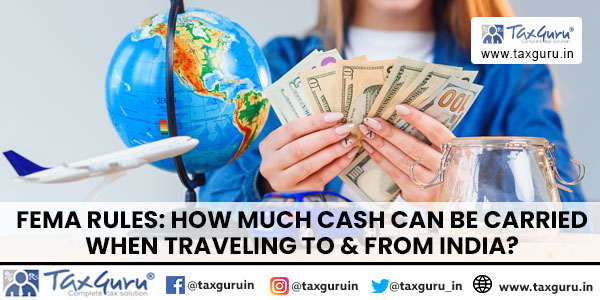The Reserve Bank of India (RBI) has laid down clear guidelines on how much cash and foreign currency Indian residents and non-residents can carry as per Foreign Exchange Management Regulations. Understanding these regulations ensures compliance and smooth travel experiences. This article provides detailed answers to frequently asked questions about carrying cash and foreign currency to and from India.
Frequently Asked Questions (FAQ)
Q.1 How much foreign currency can I carry while traveling abroad?
Ans. Resident travellers are permitted to purchase foreign currency notes and coins up to $3,000 per visit. Any remaining amount within the Liberalized Remittance Scheme limit of $250,000 per financial year can be carried in the form of store value cards, travelers’ cheques, or banker’s drafts.
Exceptions:
- Travelers to Iraq and Libya can draw foreign exchange in the form of currency notes and coins up to $5,000 or its equivalent per visit.
- Travelers to Iran, Russia, and other Republics of Commonwealth of Independent States can draw the entire foreign exchange (up to $250,000) in the form of currency notes or coins.
- Travelers for Haj/Umrah can carry the full entitlement of $250,000 in cash or as specified by the Haj Committee of India.

Q.2 How much Indian currency can be brought back to India?
Ans.
- Residents of India returning from a temporary visit abroad (except Nepal and Bhutan) may bring back Indian currency notes up to an amount not exceeding Rs 25,000.
- A person coming into India from Nepal or Bhutan may bring Indian currency notes in denominations not exceeding Rs 100.
- Any person resident outside India, not being a citizen of Pakistan and Bangladesh and also not a traveller coming from and going to Pakistan and Bangladesh and visiting India may bring into India currency notes of Government of India and Reserve Bank of India notes up to an amount not exceeding Rs.25,000 while entering only through an airport.
Q.3 How much foreign exchange can be brought in while visiting India?
Ans. A person coming into India from abroad can bring foreign exchange without any limit. However, if the aggregate value of the foreign exchange in the form of currency notes, bank notes, or travellers’ cheques exceeds $10,000 or its equivalent and/or the value of foreign currency alone exceeds $5,000 or its equivalent, it should be declared at Customs in the Currency Declaration Form (CDF) on arrival.
Q.4 How much forex can non-residents carry when going abroad?
Ans. Non-residents leaving India are allowed to carry foreign currency not exceeding the amount brought by them, i.e., they can take with them the unspent foreign exchange left from the amount declared in the Currency Declaration Form at the time of their arrival in India.
Q.5 Can the full rupee equivalent of foreign exchange for travel abroad be paid in cash?
Ans. Foreign exchange for travel abroad can be purchased from an authorized person against rupee payment in cash below Rs 50,000 only. If the sale of foreign exchange is for more than Rs 50,000, the entire payment must be made by a crossed cheque, banker’s cheque, pay order, demand draft, debit card, credit card, or prepaid card.
Q.6 Can unspent forex be kept for future use?
Ans. Foreign exchange up to $2,000 in the form of foreign currency notes or travelers’ cheques (TCs) can be indefinitely retained for future use. Any foreign exchange in cash exceeding this amount must be surrendered to a bank within 90 days and TCs within 180 days of return. Any amount in excess of $2,000 can be credited to an RFC(D) account.
Q.7 Should foreign coins be surrendered to an Authorized Dealer on return from abroad?
Ans. Residents can hold foreign coins without any limit.
Conclusion
Understanding and adhering to the RBI’s guidelines on carrying cash and foreign currency is crucial for Indian residents travelling abroad. By being informed about these regulations, travellers can avoid potential legal issues and ensure a hassle-free journey. Whether it’s managing the amount of cash carried or knowing how much foreign currency can be brought into India, staying compliant with these rules is essential for a smooth travel experience.





